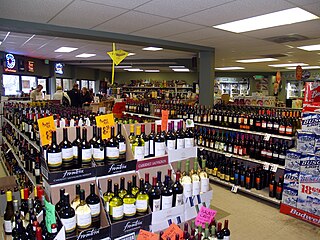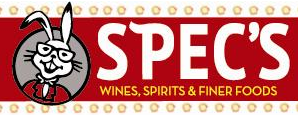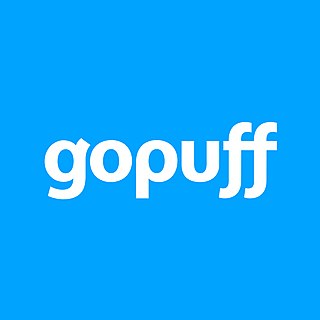
Low-alcohol beer is beer with little or no alcohol by volume that aims to reproduce the taste of beer while eliminating or reducing the inebriating effect, carbohydrates, and calories of regular alcoholic brews. Low-alcohol beers can come in different beer styles such as lagers, stouts, and ales. Low-alcohol beer is also known as light beer, non-alcoholic beer, small beer, small ale, or near-beer.

The Liquor Control Board of Ontario (LCBO) is a Crown agency that retails and distributes alcoholic beverages throughout the Canadian province of Ontario. It is accountable to the Legislative Assembly through the minister of finance. It was established in 1927 by the government of Premier George Howard Ferguson to sell liquor, wine, and beer. Such sales were banned outright in 1916 as part of prohibition in Canada. The creation of the LCBO marked an easing of the province's temperance regime. By September 2017, the LCBO was operating 651 liquor stores.

In the United States, beer is manufactured in breweries which range in size from industry giants to brew pubs and microbreweries. The United States produced 196 million barrels (23.0 GL) of beer in 2012, and consumes roughly 28 US gallons (110 L) of beer per capita annually. In 2011, the United States was ranked fifteenth in the world in per capita consumption, while total consumption was second only to China.

A liquor store is a retail business that predominantly sells prepackaged alcoholic beverages, including liquors, wine or beer, usually intended to be consumed off the store's premises. Depending on region and local idiom, they may also be called an off-licence, off-sale, bottle shop, bottle store or, colloquially, bottle-o, liquor store or other similar terms. A very limited number of jurisdictions have an alcohol monopoly. In US states that are alcoholic beverage control (ABC) states, the term ABC store may be used.

Alcoholic beverage control states, generally called control states, less often ABC states, are 17 states in the United States that have state monopoly over the wholesaling or retailing of some or all categories of alcoholic beverages, such as beer, wine, and distilled spirits.

RH is an upscale American home-furnishings company headquartered in Corte Madera, California. The company sells its merchandise through its retail stores, catalog, and online. As of August 2018, the company operated a total of 70 galleries, 18 full-line design galleries, and 3 baby-and-child galleries. The company also has 36 outlet stores in the United States and Canada.

Alcohol Beverage Services, previously known as the Department of Liquor Control is a government agency within the County of Montgomery, Maryland, and is the wholesaler of beer, wine and spirits alcoholic beverage throughout the county's 507-square-mile (1,310 km2) area. Montgomery County Department of Liquor Control also exercises control over retail sales for off-premises consumption, either through government-operated package stores or designated agents.
Total Wine & More is an American alcohol retailer founded and led by brothers David and Robert Trone. The company was named Retailer of the Year by Market Watch in 2006, Beverage Dynamics in 2008, and Wine Enthusiast Magazine in 2004 and 2014. The company is headquartered in North Bethesda, Maryland.
The Washington State Liquor and Cannabis Board, formerly the Washington State Liquor Control Board, is an administrative agency of the State of Washington. The Liquor and Cannabis Board is part of the executive branch and reports to the Governor. The board's primary function is the licensing of on and off premises establishments which sell any type of alcohol, and the enforcement and education of the state's alcohol, tobacco, and cannabis laws.

Grocery Outlet Holding Corp. is an American discount closeout retailer consisting exclusively of supermarket locations that offer discounted, overstocked, and closeout products from name-brand and private-label suppliers. The company has stores in California, Oregon, Washington, Idaho, Nevada, Maryland, Pennsylvania, New Jersey, Ohio, and Delaware.

FedMart was a chain of discount department stores started by Sol Price, who later founded Price Club. Originally a discount department store open to government employees paying a $2 per family membership fee, FedMart earned four times more than its investors had projected in its first year. Over the next 20 years, FedMart grew to include 45 stores, mostly in California, and the Southwest in a chain that generated over $300 million in annual sales. The business expanded to several states in the Southwest United States. Many stores were previous White Front or Two Guys locations. Price later sold two-thirds of the chain to Hugo Mann, a German retail chain, in 1975 and was forced out of his leadership position the following year. FedMart went out of business in 1982.

99 Cents Only Stores LLC was a price-point retailer chain based in Commerce, California, United States of America. It offered "a combination of closeout branded merchandise, general merchandise and fresh foods." The store initially offered all products for 99¢ or less. The base price became 99.99¢ in 2007 and products were later introduced at higher prices.

A liquor license is a governmentally issued permit for businesses to sell, manufacture, store, or otherwise use alcoholic beverages.

Majestic Wine is a British wine retailer based in Watford, England. The company employs more than 1,300 employees nationwide, and operates more than 200 stores across the United Kingdom.

Spec's Wine, Spirits & Finer Foods, is a Texas family-owned liquor store chain, with headquarters in Midtown, Houston.

GoBrands, Inc., doing business as Gopuff, is an American consumer goods and food delivery company headquartered in Philadelphia, Pennsylvania. The company operates in more than 650 US cities through approximately 500 microfulfillment centers as of October 2021. It also operates in the United Kingdom, following a takeover of Newcastle upon Tyne-based Fancy. As of July 2021, the company was valued at $15 billion.

Minibar Delivery is an online alcohol service based in New York City, offering on-demand delivery in over 50 American cities and shipping to 40 states. It was founded in 2014 by Lara Crystal and Lindsey Andrews. Minibar Delivery connects customers with local liquor stores as well as vineyards for delivery to their location via the company's mobile app and website.

Hae Un Lee was a Korean-born American businessman and the chief executive officer of Lee's Discount Liquor, which he founded in Nevada in 1981, after immigrating to the United States from South Korea a year earlier. By 2006, the company had become the largest alcohol retailer in Nevada. As of 2017, it operated 22 locations statewide. Lee was a well known philanthropist in his hometown of Las Vegas, where he also owned the Koreatown Plaza shopping center.

Lee's Discount Liquor is a chain of liquor stores in Nevada. It was founded by Hae Un Lee in 1981, and is the largest liquor retailer in the state, with 22 locations as of 2017. Besides the Las Vegas Valley and Reno, the company also has stores in Mesquite and West Wendover, two locations that are popular with residents of nearby Utah, where alcohol laws are more strict. The company is known for its humorous advertising, which often featured Hae Un Lee and his son Kenny Lee, who respectively served as chief executive officer and president for the company. Hae Un Lee died of pancreatic cancer in 2021, and Kenny Lee took over as CEO, serving until his death in a car crash less than three months later.

Proposition 125 was a citizen-initiated, statewide ballot measure that was approved in Colorado on November 8, 2022. The measure allowed for grocery and convenience stores that sell beer to also sell wine.



















